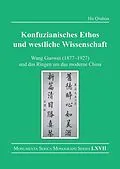This study in German offers profound insights into the life and thoughts of Wang Guowei (1877-1927). Like many intellectuals who strongly perceived the necessity of reforms in the waning years of the Late Qing dynasty, i.e. after the Opium wars, Wang sought to strengthen China's position against foreign, in particular Western, powers. Contrary to earlier approaches, which either advocated a close adherence to Confucian traditions or tried to adapt only elements of Western material culture, mainly industrial and military technology, Wang Guowei aimed at reviving traditional Chinese culture by analysing its source texts using a modern scientific approach (and thereby started the discipline of guoxue [national studies]) and simultaneously adapting compatible elements of Western immaterial culture. Thus, Wang became known as an authority on Chinese paleography as well as on German philosophy, especially Kantian epistomology.
Autorentext
Hu Qiuhua is lecturer for Chinese at the University of Zurich.
Inhalt
Kapitel I: Wang Guowei und die neue chinesische Wissenschaftskultur Die Entstehung des guoxue -Konzepts
Kapitel II: Wang Guowei als Pionier der neuen chinesischen Altertumswissenschaft
Kapitel III: China, Deutschland und die Altertumswissenschaft Chen Yinque als Fortsetzer des Geschichtsdenkens Wang Guoweis
Kapitel IV: Die Wirkungsgeschichte von Wang Guoweis Schaffen
Kapitel V: Wang Guowei, Hsu Cho-yun und die Frage nach einer chinesischen Modernisierung
